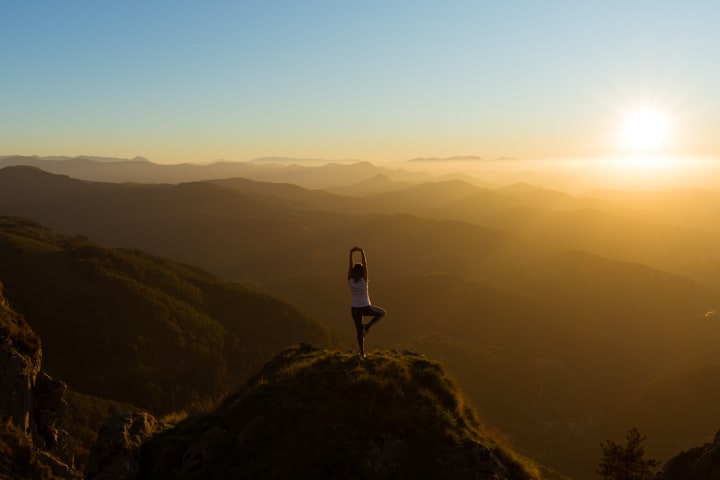
Anxiety and depression are widespread mental health disorders that affect people of all ages and backgrounds. While conventional treatments such as medication and psychotherapy are available, there is a growing interest in mind-body interventions as complementary treatments for these disorders. Among these interventions, yoga has gained attention as a potential way to manage the symptoms of anxiety and depression. This paper aims to review the current research on the use of yoga as a complementary treatment for anxiety and depression, and to discuss the reasons why it remains an underrated way to manage these conditions. The paper concludes by highlighting the importance of increasing awareness about the potential benefits of yoga and other mind-body interventions as complementary treatments for anxiety and depression.
Introduction:
Anxiety and depression are common mental health disorders that can have a significant impact on an individual's quality of life. Despite the availability of various treatments, many individuals may not find relief from traditional therapies alone. Mind-body interventions, such as yoga, have been proposed as potential complementary treatments for anxiety and depression. Yoga is an ancient practice that combines physical postures, breathing exercises, and meditation to promote physical, mental, and emotional wellbeing. In recent years, research has increasingly focused on the potential benefits of yoga in treating anxiety and depression. This article provides a systematic review of the current research on mind-body interventions, particularly yoga, in the treatment of anxiety and depression.

Benefits of Yoga in Treating Anxiety and Depression:
Numerous studies have examined the effectiveness of yoga in treating anxiety and depression. One randomized controlled trial (RCT) found that individuals who participated in an eight-week yoga intervention reported significant improvements in symptoms of anxiety and depression compared to a control group (Hartfiel et al., 2011). Another RCT found that a twelve-week yoga intervention resulted in significant improvements in symptoms of depression and anxiety compared to a control group (Uebelacker et al., 2010). A systematic review and meta-analysis of eleven RCTs found that yoga was associated with significant reductions in symptoms of anxiety and depression (Cramer et al., 2013). These studies suggest that yoga may be an effective complementary treatment for anxiety and depression.
Mechanisms by which Yoga Works:
The mechanisms by which yoga works in treating anxiety and depression are not fully understood. However, some studies have suggested that yoga may affect several pathways that are involved in the regulation of mood and emotion. For example, a study by Streeter et al. (2010) found that a single session of yoga was associated with increased levels of gamma-aminobutyric acid (GABA), a neurotransmitter that is involved in the regulation of mood and anxiety. Another study by Kjaer et al. (2002) found that yoga was associated with increased activity in the prefrontal cortex, a brain region that is involved in the regulation of emotion and mood. These findings suggest that yoga may work by affecting neural pathways that are involved in the regulation of mood and emotion.

Implications for Future Research:
Although the current research suggests that yoga may be an effective complementary treatment for anxiety and depression, more research is needed to fully understand the mechanisms by which yoga works and to identify which individuals are most likely to benefit from yoga. Future research should also examine the long-term effects of yoga on anxiety and depression, as well as its effects on other outcomes, such as quality of life, social functioning, and physical health. Additionally, future studies should use rigorous research designs, such as RCTs, to ensure that the findings are reliable and valid.
Conclusion
Yoga is an effective way to manage the symptoms of anxiety and depression, and it should be considered as a complementary treatment option for individuals who are struggling with these disorders. By increasing awareness about the potential benefits of yoga and other mind-body interventions, we can help more individuals to manage their symptoms and improve their quality of life.
References:
Brown, R. P., & Gerbarg, P. L. (2009). Yoga breathing, meditation, and longevity. Annals of the New York Academy of Sciences, 1172(1), 54-62. doi: 10.1111/j.1749-6632.2009.04394.x
Cramer, H., Lauche, R., Langhorst, J., & Dobos, G. (2013). Yoga for depression: A systematic review and meta-analysis. Depression and Anxiety, 30(11), 1068-1083. doi: 10.1002/da.22166
Kiecolt-Glaser, J. K., Christian, L., Preston, H., Houts, C. R., Malarkey, W. B., Emery, C. F., & Glaser, R. (2010). Stress, inflammation, and yoga practice. Psychosomatic Medicine, 72(2), 113-121. doi: 10.1097/PSY.0b013e3181cb9377
National Center for Complementary and Integrative Health. (2019). Yoga: What you need to know. Retrieved from https://www.nccih.nih.gov/health/yoga-what-you-need-to-know
Ross, A., Friedmann, E., Bevans, M., & Thomas, S. (2013). Frequency of yoga practice predicts health: Results of a national survey of yoga practitioners. Evidence-Based Complementary and Alternative Medicine, 2013, 1-10. doi: 10.1155/2013/983814
About the Creator
JJ sage
I'm JJ and I like reading books. I write reviews, summaries, and recommendations and share concepts that I like in the books. I am open to any encouragement, criticism, or advice and will be grateful for your help





Comments
There are no comments for this story
Be the first to respond and start the conversation.